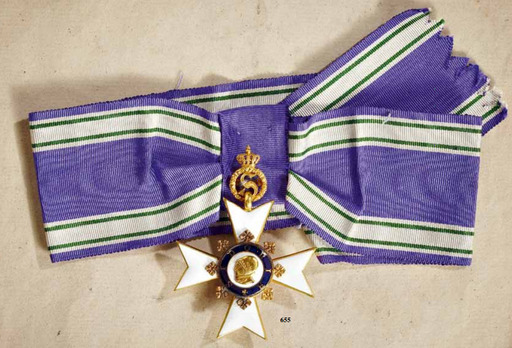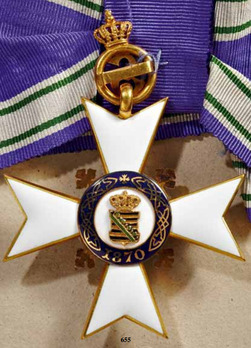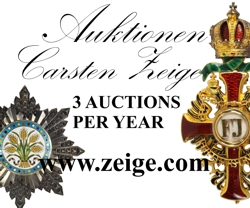Order of Sidonia, Cross
SKU: 01.SXK.0109.102.01
Estimated market value:



Estimated market value:
Attributes
Physical Description
A Maltese cross, constructed of gold and enamel. On top of the 12 o’clock arm, attached by an eyelet, sits a crowned oak leaf wreath with the monogram ‘S’ inside. The arms are enamelled in white with narrow golden edges. The obverse centre medallion is enamelled in white and features the left-facing head of Duchess Sidonie in gold. The medallion ring is enamelled in blue with golden and smooth inner and outer borders. It features the golden inscription ‘SIDONIA’ with a small cross at the top. Eight rue leaves are attached to the outer medallion ring border, only four of which are visible from the reverse. The reverse is similar to the obverse, except that the centre medallion features a crowned Saxon coat of arms in multi-coloured enamel. The medallion ring features a small cross at the top and the date ‘1870’ at the bottom, with ornamental decorations in between. On a loop for suspension, on a dark blue ribbon with white side stripes. The white side stripes feature two narrow green stripes each.
History
The Order of Sidonia was founded by King John on December 31, 1870. It was conferred upon women in recognition of merit during a war period. This was the first order for women in Saxony.
The order was primarily awarded to women that had demonstrated self-sacrifice and altruism by caring for wounded soldiers during the Franco-Prussian War of 1870/71. It could be awarded to any national, by birth or marriage, that serviced Saxony, with a few exceptions for foreigners. It was awarded to both single and married women. The right to award the decoration was exclusive to the king.
The name of the order commemorates Duchess Sidonie of Bohemia, the first wife of Duke Albert of Saxony, also known as Albert the Beloved (1443-1500).
This order features one class, but is worn in two different styles. It was worn on a sash by members of a royal family. The order was awarded a total of 109 times, of which twelve were awarded to foreigners, eight on the Grand Cross sash, and four with the Cross on the ribbon.
The order became obsolete in 1918 with the end of the monarchy.
The Cross was awarded 96 times on the bow, of which 72 were in gold and 24 were in silver gilt. Of the entire 96, four were awarded to non-Saxon women.


Comments
Sign in to comment and reply.


Scroll Top